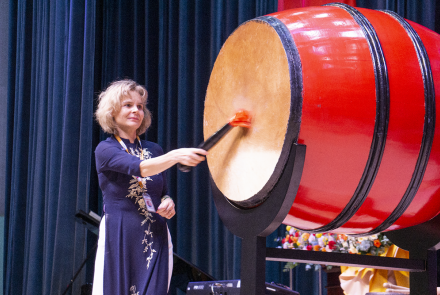The best job in the world
After two years working in Vietnam, what do you think about Vietnamese teachers?
I have the greatest respect for Vietnamese teachers. Any person who takes upon themselves the responsibility of looking after the healthy growth of a child is to be praised. Childhood and youth is a unique time of life because it is a time of such rapid change. In my mind, it is sacred. We adults have an enormous responsibility to protect and nurture our children. You know, Vietnamese Teachers’ Day is also World Children’s Day.
A teacher is someone who is willing to share what they know about the world, someone who believes in the goodness of humanity. To be an excellent teacher, you have to have a deep understanding of human nature and compassion for the world. While we are talking here of school teachers as a profession, I think we should also recognise the many people who act as teachers in the workplace or elsewhere.
My opinion of Vietnamese teachers has not changed during these two years in Vietnam. The greatest strength of Vietnamese teachers is their willingness to learn and develop as teachers. It is the mark of any good teacher.
I came here expecting to find people committed to education and I found people committed to education. What has changed, of course, is my understanding of Vietnamese society and the unique challenges that you face in education.
In your opinion, what influences a teacher’s career?
Getting a teaching degree is just the beginning of a long journey to become an excellent teacher. As a teacher, you are never ‘ready’. There’s always a feeling that you could have done something better. That’s why it’s such an interesting profession.
We are all products of our own education. I have been very privileged to be educated on three continents-Africa, Europe and North America-as well as teach on four continents-North America, Australia, Europe and now Asia. What I can say of all the education systems I have experienced is that the best ones view the child as an individual and avoid standardisation, whether it’s through the content of the curriculum or through standardised testing. There’s a lot of pressure to view schools like factories: you pop in the raw material of a child and out pops the finished product of an adult ready to join the workforce. But a school is not a factory and the benefits of education are profound and hard to measure.
Teachers operate within the system they are given. Change has to come from the political leaders. Do they want to be forward-thinking and innovative? Are they willing to give teachers the resources and freedom teachers need to do a good job?
Each education system is on its own path and is a reflection of its society and history. In Finland, we hold certain values, such as equality, very important. What values do you in Vietnam hold important? Your education system will reflect those values.
How do you feel about the spiritual and material life of Vietnamese teachers?
I think teachers should be paid more. Working with a group of children, preparing good lessons, assessing student work, communicating with parents and colleagues-it’s exhausting. The interaction is intense and your intellect is constantly challenged.
Caring for human beings who are still growing, still immature, still learning who they are and how to live in the world, it’s not easy. It requires a lot of compassion. I think all societies are very lucky that, as a group of professionals, teachers are not characterised by materialism and greed. Of course, there are exceptions.
In terms of the spiritual life of teachers, I think we are very lucky. We get to do work that is meaningful. So many people are involved in souldestroying jobs that harm other human beings and nature. I think most teachers can say at the end of the day, “I helped make someone’s life better”.
It seems that Vietnamese teachers are dominated by many things in the teaching process, one of them is demands from parents and superiors. Do you think so?Are Finnish teachers dominated by these factors?
I think the word ‘dominate’ is too strong a word. As teachers, it is our job to listen to others, including parents. Parents are the main educators of their child. Teachers are professionals who have spent many years studying to become a teacher. Parents are not objective judges of their child’s ability. Sometimes they see what they want to see. Teachers, on the other hand, have seen many classes, even generations, of children pass through their hands. They can judge a child’s strengths and weaknesses better than a parent. Finnish and other non-Vietnamese teachers are also under pressure, for example, to give higher grades. The unfortunate result is that grades do not reflect ability accurately. Grade inflation is something we must all fight against. Both sides need to listen carefully to each other. Ideally, parents and teachers cooperate for the best of the child.
A message from you to teachers on Vietnamese Teachers’ Day, November 20th, 2020.
Thank you for your hard work today and every day! The job of a teacher requires patience and a lot of energy, but it is also one of the most rewarding jobs in the world.
Let us hope our leaders have the wisdom to give teachers and schools the resources and freedom they need in order to do their job properly. Together we adults can ensure a better future for all children and for our planet.




